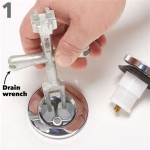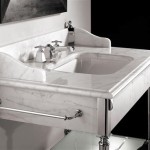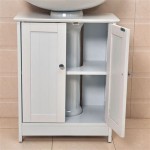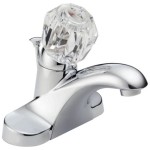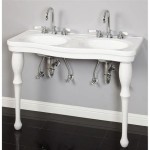Standard Bathroom Sink Waste Size: Essential Aspects
The standard bathroom sink waste size is a crucial aspect of plumbing that ensures proper drainage and prevents water accumulation. Understanding the essential aspects of waste size is vital for efficient bathroom functionality. This article explores the key aspects related to standard bathroom sink waste size, serving as a comprehensive guide for homeowners and professionals alike.
Size and Compatibility
The standard bathroom sink waste size refers to the diameter of the drain opening. In most cases, the standard size is 1 1/4 inches, which accommodates most sink drains and pop-up assemblies. Ensuring compatibility between the sink drain and waste size is essential for proper water flow and to prevent leaks.
Types of Waste
There are two primary types of bathroom sink wastes: pop-up and grid strainer wastes. Pop-up wastes feature a stopper that seals the drain when not in use, while grid strainer wastes have a removable grid that catches debris and prevents it from entering the drain.
Shape and Configuration
Bathroom sink wastes come in various shapes and configurations to suit different sink designs. The most common shape is round, but square and rectangular wastes are also available. The configuration refers to the length and shape of the tailpiece, which connects the waste to the drainpipe.
Materials and Finishes
Bathroom sink wastes are typically made from durable materials such as PVC (Polyvinyl Chloride) or brass. PVC wastes are lightweight and resistant to corrosion, while brass wastes offer a more substantial and elegant look. The finishes include polished chrome, brushed nickel, and oil-rubbed bronze to complement the bathroom décor.
Installation Considerations
Proper installation of the bathroom sink waste is crucial to ensure a watertight seal and optimal drainage. It involves attaching the waste to the sink drain and connecting the tailpiece to the drainpipe using a slip joint nut. Plumbers' putty or silicone sealant is typically used to create a watertight seal.
Maintenance and Troubleshooting
Regular maintenance of the bathroom sink waste can prevent clogs and ensure smooth water flow. Cleaning the grid strainer or stopper regularly removes debris, while periodically tightening the slip joint nut can prevent leaks. If clogs occur, using a drain snake or chemical drain cleaner can restore water flow.

Rough In Plumbing Bathroom Dimensions Jim The Home Guy

Pop Up Lift Turn Pull Out Stopper Bathroom Sink Drains

Pop Up Lift Turn Pull Out Stopper Bathroom Sink Drains

How To Plumb A Bathroom With Multiple Plumbing Diagrams Hammerpedia

What Is The Standard Size For Drain Hole In A Bathroom Sink Hunker

What Size Pipe For Sink Drain Choosing Tips

What Is The Standard Bathroom Sink Height Finest

What Size Pipe For Sink Drain Choosing Tips

What Is The Bathroom Sink Plumbing Rough In Heights
How To Measure A Vanity Sink Bathroom Dimensions Standard Size Vevano

